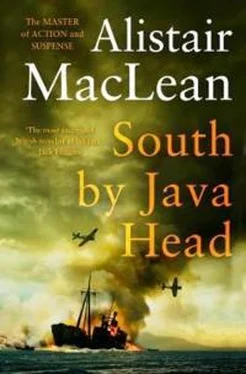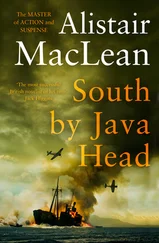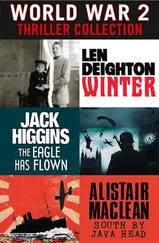“Just their sweet little selves,” Van Effen acknowledged. “I had Siran by the throat, bent back over the rail, going to force him to go through the ship. That was a mistake – I should have used my gun. I didn’t know then that all his men were – what is the phrase? – tarred with the same brush. It must have been a belaying pin. I woke up in the bottom of the boat.”
“You what?” Findhorn was incredulous.
“I know.” Van Effen smiled, a little tiredly. “It doesn’t make any kind of sense at all, does it? They should have left me to fry. But there I was – not only alive, but with my head all nicely tied up. Curious, is it not, Captain? ”
“Curious is hardly the word.” Findhorn’s voice was flat, without inflection. “You are telling the truth, Mr. Van Effen? A silly question, I suppose – whether you are or not, you’d still say ‘yes’.”
“He is, Captain Findhorn.” Farnholme’s voice sounded oddly confident and, for that moment, not at all like the voice of Brigadier Farnholme. “I am perfectly certain of that.”
“You are?” Findhorn turned to look at him, as had everyone, caught by something peculiar in Farnholme’s tone. “What makes you so sure, Brigadier?”
Farnholme waved a deprecating hand, like a man who finds himself being taken more seriously than he intended. “After all, I know Van Effen better than anybody here. And his story has to be true: if it weren’t true, he wouldn’t be here now. Something of an Irishism, gentlemen, but perhaps you follow?”
Findhorn nodded thoughtfully but made no comment. There was silence for some time in the dining-saloon, a silence broken only by the distant crash of bows in a trough in the seas, the indefinable creaking noises a ship makes when it works with the waves in heavy weather, and the shuffling of the feet of the crew of the Kerry Dancer . Then Findhorn looked at his watch and turned to Nicolson.
“The bridge for us, Mr. Nicolson, I suggest: from the feel of things we’re running into the heavy stuff again. For Captain Siran and his crew, an armed guard for the remainder of the night, I think.” Findhorn’s eyes were as bleak and cold as his voice. “But there’s one little point I’d like to clear up first.”
He walked unhurriedly towards the crew of the Kerry Dancer , balancing himself easily against the heavy rolling of the ship, then halted as Van Effen stretched out his hand.
“I’d watch them if I were you,” the Dutchman said quietly. “Half of them carry more than one knife and they’re not slow with them.”
“You have a gun.” Findhorn put out his hand and took the automatic which Van Effen had stuck in his waistband. “May I?” He glanced down at the weapon, saw that the safety catch was still on. “A Colt .38.”
“You know guns, yes?”
“A little.” Soft-footed, Findhorn walked across to the nearest man in the group in the corner. He was tall, broad-shouldered, with a brown, smooth, expressionless face: he looked as if he had got out of the habit of using expressions a long time ago. He wore a hairline moustache, black sideburns that reached three inches below his ears, and he had black, empty eyes. “You are Siran?” Findhorn asked, almost indifferently.
“ Captain Siran. At your service.” The insolence lay in the faint emphasis on the ‘captain,’ the millimetric inclination of the head. The face remained quite expressionless.
“Formalities bore me.” Findhorn was looking at him with sudden interest. “You are English, aren’t you?”
“Perhaps.” This time the lips curled, less in a smile than in a token of lazy contempt, perfectly done. “Anglo-Saxon, shall we say?”
“It doesn’t matter. You are the captain – were the captain – of the Kerry Dancer . You abandoned your ship – and abandoned all the people that you left behind to die, locked behind steel doors. Maybe they drowned, maybe they were burnt to death: it doesn’t make any difference now. You left them to die.”
“Such melodramatics!” Siran lazily patted a yawn to extinction, a masterpiece of weary insolence. “You forget the traditions of the sea. We did all in our power for those unfortunates.”
Findhorn nodded slowly and turned away, looking over Siran’s six companions. None of them seemed at all happy, but one – a thin-faced man with a cast in one eye – was especially nervous and apprehensive. He shuffled his feet constantly and his hands and fingers seemed to have an independent life of their own. Findhorn walked across and stood in front of him.
“Do you speak English?”
There was no answer, just a furrowing of brows, the raising of shoulders and outspread palms in the universal gesture of incomprehension.
“You picked well, Captain Findhorn,” Van Effen drawled slowly. “He speaks English almost as well as you do.”
Findhorn brought the automatic up quickly, placed it against the man’s mouth and pushed, none too lightly. The man gave way and Findhorn followed. The second step backward brought the man against the bulkhead, palms of his outstretched hands pressing hard against the wall, his one good eye staring down in terror at the gun that touched his teeth.
“Who hammered shut all the clips on the poop-deck door?” Findhorn asked softly. “I’ll give you five seconds.” He pressed more heavily on the gun and the sudden click of the safety catch snicking off was unnaturally loud in the strained silence. “One, two–”
“I did, I did!” His mouth was working and he was almost gibbering with fear. “I closed the door.”
“On whose orders?”
“The captain. He said that–”
“Who shut the fo’c’sle door?”
“Yussif. But Yussif died–”
“On whose orders?” Findhorn asked relentlessly.
“Captain Siran’s orders.” The man was looking at Siran now, sick fear in his eye. “I’ll die for this.”
“Probably,” Findhorn said carelessly. He pushed the gun into his pocket and walked across to Siran. “Interesting little talk, wasn’t it, Captain Siran?”
“The man’s a fool,” Siran said contemptuously. “Any terrified man will say anything with a gun in his face.”
“There were British soldiers – probably your own countrymen – in the fo’c’sle. A score, maybe two dozen, I don’t know, but you couldn’t have them cluttering up your getaway in the only boat.”
“I don’t know what you’re talking about.” Siran’s brown face was still the same, still without expression. But his voice was wary now, the calculated insolence gone.
“And there were over twenty people in the aftercastle.” Siran might not have spoken for all the attention Findhorn paid to him. “Wounded men, dying men, women – and one little child.”
This time Siran said nothing. The smooth face was impassive as ever, but his eyes had narrowed, just perceptibly. When he spoke, however, his voice still held its insolent indifference.
“And just what do you hope to achieve by all this stupid rigmarole, Captain Findhorn? ”
“I hope for nothing.” Findhorn’s lined face was grim, the faded eyes bleak and relentless. “It’s not a question of hope, Siran, but of certainty – the certainty of your conviction for murder. In the morning we shall take independent statements from all the members of your own crew and have them signed in the presence of neutral witnesses from my crew. I shall make it my personal responsibility to see to it that you arrive in Australia safely and in good health.” Findhorn picked up bis hat and prepared to leave. “You will have a fair trial, Captain Siran, but it shouldn’t last long, arid the penalty for murder, of course, is known to us all.”
For the first time, Siran’s mask of impassivity cracked and the faintest shadow of fear touched the dark eyes, but Findhorn wasn’t there to see it. He was already gone, climbing up the companionway to the shrieking bridge of the Viroma .
Читать дальше
Конец ознакомительного отрывка
Купить книгу










